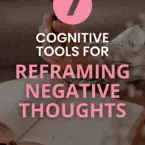
Depression can feel like you’re trapped in a never-ending cycle of negative thoughts and despair. But what if we told you that it’s possible to break free from this loop? Cognitive tools, derived from cognitive-behavioral therapy (CBT), can help you reframe these negative thoughts, offering a new perspective on your feelings and experiences. Ready to pull yourself out of the downward spiral? Here are seven cognitive tools that might just do the trick.
1. Thought Records
A thought record is a cognitive tool used to identify and challenge negative thinking patterns. It involves documenting your negative thoughts, recognizing the triggers and consequences of these thoughts, and then reframing them into more rational or positive alternatives.
2. The Socratic Method
This involves questioning your negative thoughts and assumptions to reveal the illogical or unfounded nature of these beliefs. For instance, if you believe “I’m a failure,” you might ask yourself, “What’s the evidence that supports this belief?” or “Is there another, more positive way to look at this situation?”
3. Mindfulness
Mindfulness involves being fully present in the moment without judgment. It allows you to observe your thoughts and feelings as they are, without trying to change them. Practicing mindfulness can help you develop a more balanced perspective and reduce the intensity of negative emotions.
4. Behavioral Activation
This cognitive tool is about doing more of what brings you joy and less of what drains you. It might involve setting small, achievable goals to increase your engagement in positive activities, which can help counter negative thoughts and feelings.
Related: 10 Creative Outlets to Help You Pull Out of Depression >>
5. Cognitive Rehearsal
Cognitive rehearsal involves mentally practicing how you will handle a challenging situation before it occurs. By envisioning a positive outcome, you can challenge negative thinking and increase your confidence in your ability to cope.
6. Gratitude Journaling
Keeping a gratitude journal involves writing down what you’re thankful for each day. This simple act can shift your focus from negative thoughts and help you recognize the positive aspects of your life.
7. Mindset Shift: Growth vs. Fixed
A growth mindset believes that abilities and intelligence can be developed, whereas a fixed mindset believes they are set in stone. By adopting a growth mindset, you can reframe negative thoughts like “I can’t do this” to “I can learn how to do this.”
Remember, using these cognitive tools takes practice, and progress might be slow. But every step, no matter how small, is a step in the right direction.
Depression is not a journey you have to embark on alone. If your symptoms persist or worsen, reach out to a mental health professional. These cognitive tools can complement professional therapy, but they aren’t a substitute for it.
Nobody ever said that battling depression was easy. It’s a steep, uphill climb, but every step you take is one step closer to the top. With these cognitive tools in your toolkit, you’re better equipped to manage negative thoughts and pull yourself out of the depths of depression.
So, let’s get to work. Let’s dig into these cognitive tools and start pulling ourselves out, one thought, one step at a time.
Related: 8 Strategies for Building Emotional Resilience to Drag Yourself Out of Depression >>















